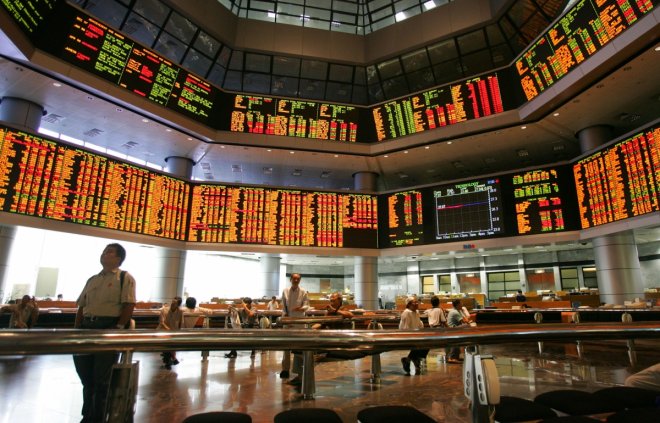
Bonds, the yen and gold jumped in Asia on Friday, while stocks slipped, as investors turned to safe-haven assets after the United States launched cruise missiles against an air base in Syria, raising the risk of confrontation with Syrian backers Russia and Iran.
The US dollar dropped as much as 0.6 percent, while gold and oil prices rallied hard, though the early market panic calmed when a US official called the attack a "one-off," with no plans for escalation.
U.S. President Donald Trump ordered the strikes on Thursday against a Syrian airbase controlled by President Bashar al-Assad's forces in retaliation for a chemical attack that killed at least 70 people on Tuesday in a rebel-held area that was launched from the base.
MSCI's broadest index of Asia-Pacific shares outside Japan was down 0.4 percent after earlier sliding as much as 0.85 percent to a 2-1/2-week low. The index is set to end the week down about 0.2 percent.
E-mini S&P 500 futures lost 0.3 percent, having earlier tumbled as much as 0.7 percent, in unusually sharp moves for Asian hours.
But Japan's Nikkei reversed course again to be up 0.5 percent, heading for a 1.1 percent drop for the week.
"It was a knee-jerk reaction because markets are starting to come back a little, as it doesn't seem like there will be further retaliation coming," said Christoffer Moltke-Leth, head of institutional client trading at Saxo Capital Markets in Singapore.
"On the other hand, this could be a positive for Trump, showing that he stands firm on his word. When a strike happens, it leads to a little bit of a spike in the president's popularity."
Facing his biggest foreign policy crisis since taking office in January, Trump took the toughest direct U.S. action yet in Syria's six-year-old civil war.
Investors had already been on edge as Trump met Chinese leader Xi Jinping in Florida for talks over flashpoints such as North Korea and China's huge trade surplus with the United States.
Secretary of State Rex Tillerson noted the attack was "proportionate", suggesting no follow-up was planned.
"The unexpected and unequivocal nature of the U.S. response to the sarin-centric carnage in Syria, by President Trump, was very much in keeping with his promise not to telegraph his military options to the world in advance of taking action," wrote Peter Kenney, senior strategist at Global Markets Advisory Group in New York.
"This comes at a time that President Trump is likely to be addressing the North Korea problem with his Chinese counterpart. Peace through strength is clearly the message."
Highs for oil and gold
The yen, a favoured haven in times of stress due to Japan's position as the world's largest creditor nation, climbed across the board. The dollar moderated losses, last trading at 110.62 yen, after touching a near-two-week low of 110.14 earlier.
The dollar was otherwise steady against a basket of currencies at 100.65, as it benefited from flows into safe-haven U.S. Treasuries.
The euro was trading at $1.0648, near its close on Thursday following comments by the European Central Bank head Mario Draghi that he sees no need to deviate from the ECB's stated policy path at least until the end of the year.
Yields on 10-year Treasury debt fell as much as five basis points to 2.289 percent, its lowest level since November, briefly breaking a significant chart barrier at 2.30 percent for the first time this year. It was last at 2.3122 percent.
Oil also rose on concerns the military intervention could affect supplies from the Middle East.
"What will be the response of Iran and Russia, two of the world's largest oil producers and staunch allies of the Assad regime? ... We will have to wait for these answers as the day moves on," said Jeffrey Halley, senior market analyst at futures brokerage OANDA in Singapore.
U.S. crude added 1.7 percent to $52.59 a barrel, after earlier touching its highest in a month, putting it on track for a 3.9 percent gain this week.
Global benchmark Brent climbed 1.5 percent to $55.71, set to end the week up 5.5 percent.
Spot gold prices added 0.9 percent to $1,262.46 an ounce after hitting their highest point since Nov. 10.
"Clearly this raises the stakes, and we expect to see gold prices continuing to push higher in the short term, at least until there is some clarity around whether this is a one-off or develops into something more," ANZ analyst Daniel Hynes said.









